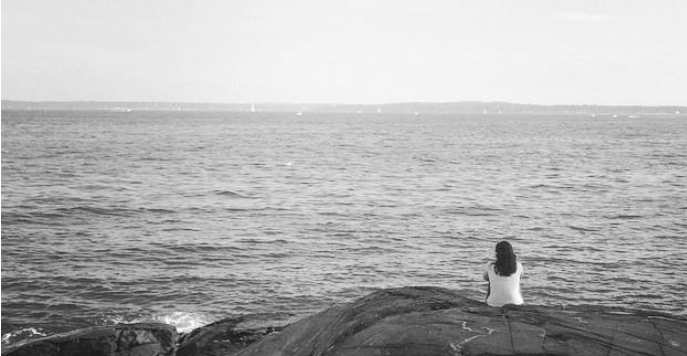|
(Don’t worry. I mean no harm. This is mostly a feel-good piece about harnessing the notion of death to help inspire your career, relationships and sense of purpose).
Death, A Few Feet Away. And Six Feet Under. Death is always just around the corner. I mean that literally: I live right next to a nursing home, and the ambulance makes visits almost daily. The blaring siren and flashing lights are enough to induce an epileptic seizure or wake my pup from blissful slumber. It’s a relentless reminder that all things must come to an end. At first, it bothered me a bit, the depressing presence of death mere yards away. My imagination ran wild trying to guess where the ambulance was headed, and whether the “horizontal passenger” would ever sit up again or, perhaps, would remain forever parallel to the ground. It’s a difference of a few feet: is he on the way to the hospital with a broken foot, or heading six feet under? My worries weren’t obsessive, but they did put a damper on things from time to time. When watching a light comedy at home after a long week, contemplating death was usually not my first choice for a Friday night activity. An End to Worrying About ‘The’ End. But humans can get used to anything, and pretty soon I came to accept the ambulance as a fact of life. Or, should I say, of death. I didn’t brush it off as a commonplace occurrence -- which it is, since 150,000+ people die every single day. I began to reflect upon it statistically, spiritually, and platonically. But before I continue, know that I’m wearing a smirk on my face because as I type this very sentence, the online radio station is playing an electronic and decidedly upbeat version of “Don’t Worry, Be Happy.” Funny how life manifests its sense of humor. As if to say, “Don’t worry. You’re going to die. Just smile.” That stressful project deadline coming up next week is not the end of the world. You Don’t Die Alone. You Die With 149,999 Others. If you’ve been a decent human being, chances are you’ll be surrounded by loved ones during your final moments on earth and so, in that sense, you won’t die in solitude. But there’s also the (reassuring?) fact that approximately 150,000 people will take their final breath on the same day you do. That comes out to nearly 55 million lives reaching their expiration date each year. But we rarely think about death from this perspective – the scale is just too great, unimaginable even, and it begins to look like something it’s not: a mass extinction. Death Can Be a Win-Win, If You Let It. I’m not romanticizing death. But if you’ve had a miserable life, then death brings the ultimate relief – to you, and perhaps to the people who’ve had to suffer in your wake (they’ll rejoice at your wake). Likewise, if you’ve had a beautiful time on earth, rife with love and friends and fantastic adventures, then death is an opportunity to celebrate all that you’ve accomplished. It’s a milestone that reminds us to cherish the sweet moments of life. Death (and tragedy in general) is a common muse for major life transformations – inspiring people to quit dead-end jobs and pursue their passions, to break free from unhealthy relationships, and to focus on healthy, self-actualizing behaviors. Like an ending to a marvelous book, it leaves you craving more, but the truth is you wouldn’t want life go on forever. Poetically, the death of someone important can make us feel the most alive, can surface deep-seated emotions, and can remind us of what’s truly important. Not the money, not the material possessions, but the connections and memories we’ve collected over the years. Parkinson’s law states that you’ll take as much time to accomplish a task as you’re given. The finite time we have on this planet, a century and change at most, forces us to determine what’s most precious and urges us to pursue it vigorously. Following that law, if we had all the time in the world, many of us would accomplish very little. Because, you know, there’s always tomorrow. Death and Culture – It’s All Relative! Although common in many parts of the US and Europe, the somber and black-garbed funeral is not the only way to observe the ceremony of death -- not by a long shot. The way we mourn or celebrate death is largely a function of our society, religion and culture. There’s a fascinating TED talk on various funeral rituals around the world. Cue the music -- it’s party time! From Indonesia to Tibet, Bali to New Orleans, the ceremony can be an explosive feast of color and sound – and why not? The older I get, and the more funerals I attend, the more I think my own funeral should be a happy celebration. Perhaps it’s time to update my will... How do YOU cope with the idea of mortality? Do you completely banish the thought from your mind, or do you spend countless hours at work actively planning your funeral – music playlist, party favors and all? Have you ever been inspired by death to do something positive? Share your comments below.
1 Comment
Dawid Wiacek
2/18/2024 01:00:08 pm
I revisited this article nearly a decade after the idea of writing it came to my mind (I think I hesitated a little bit before publishing it due to its somewhat intense topic), and my feelings about it have stayed pretty much the same--deepened even. Deeper sense of gratitude, of curiosity, of peace.
Reply
Your comment will be posted after it is approved.
Leave a Reply. |
About DawidPoly-creative and complex human who fills up his days as a career coach, executive coach, resume writer, and personal brand / communications specialist. Conqueror of excuses and doubts. Bakes a mean éclair and snaps thought-provoking photos, but is best known for helping clients achieve personal + professional growth and fulfillment. Archives
May 2024
Categories
All
|


 RSS Feed
RSS Feed